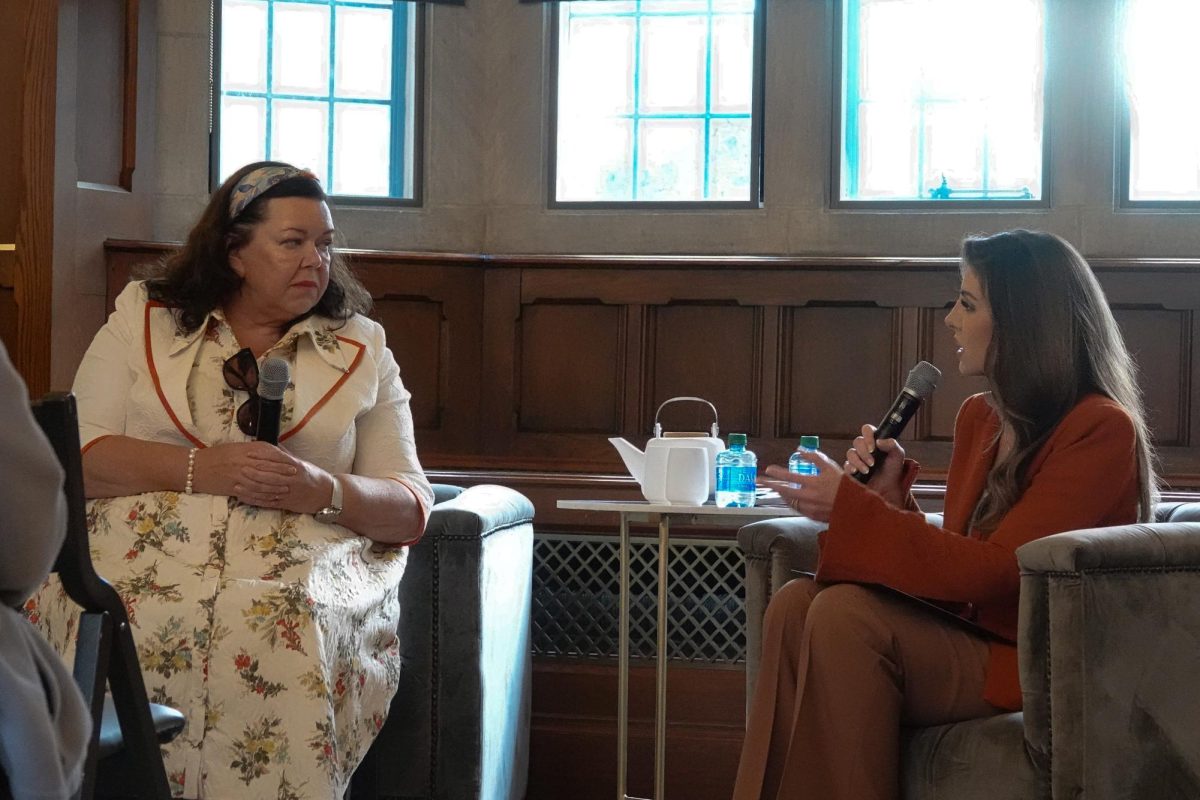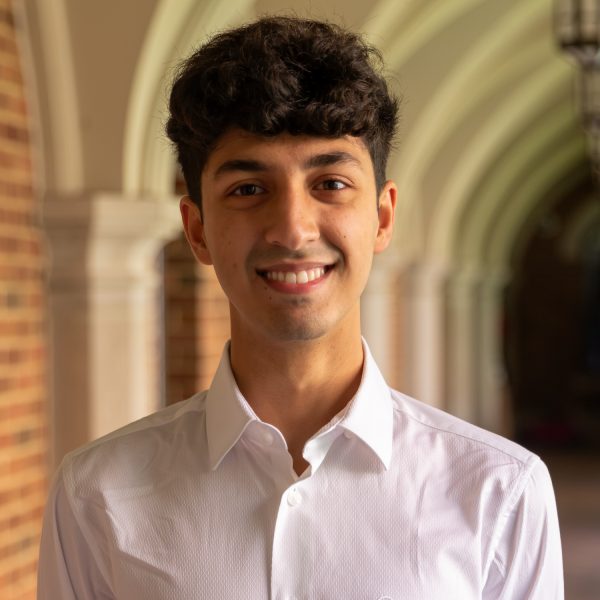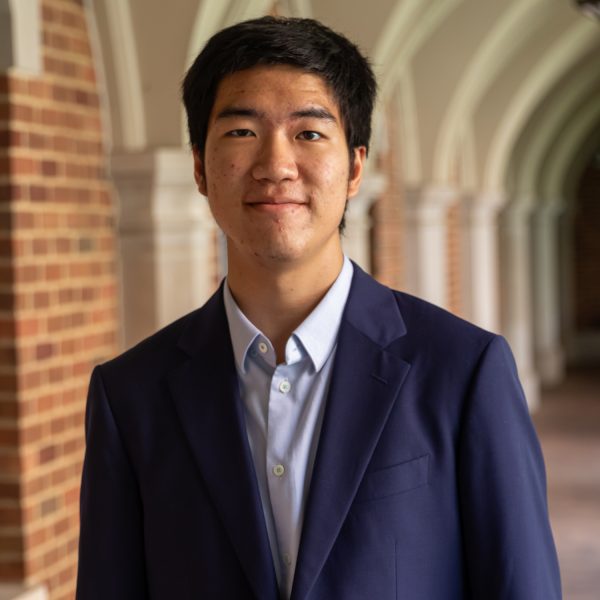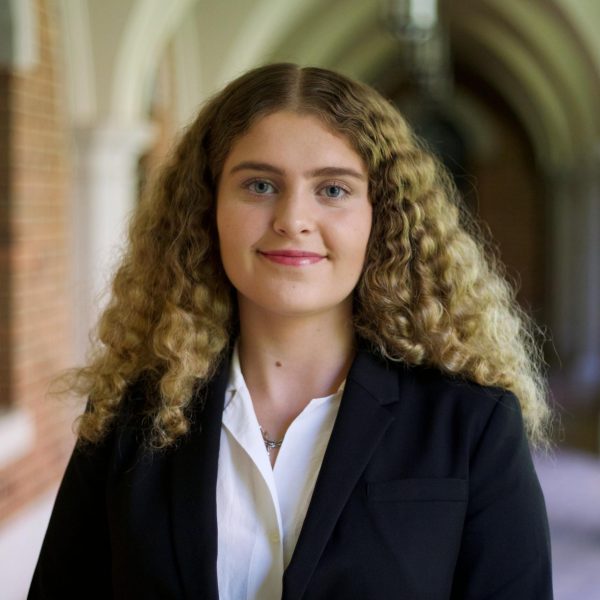Dame Karen Pierce, British ambassador to the United States, discussed foreign politics in a public “fireside chat” hosted by former U.S. Department of State spokesperson Morgan Ortagus at Alumni Hall on Oct. 23. Pierce spoke on ongoing international conflicts, security, trade and post-Brexit U.S.-United Kingdom relations during the event.
Pierce served as British ambassador to Afghanistan from 2015-16, permanent representative of the U.K. to the United Nations from 2018-20 and British ambassador to the U.S. beginning in March 2020. Ortagus, who served as U.S. Department of State spokesperson from 2019-21, moderated a previous fireside chat with Mikko Hautala, Finnish ambassador to the U.S., in November 2022. Vanderbilt also hosted Irish ambassador Geraldine Byrne Nason in January of this year.
“Welcoming Ambassador Pierce tonight signifies Vanderbilt’s commitment to being a global university in every sense of the word — engaging with people and issues around the globe, and bringing our scholarship and innovative capacity to bear on urgent challenges that have and know no boundaries,” Chancellor Daniel Diermeier said to commence the event.
Middle East
Ortagus and Pierce opened their conversation on the topic of the Middle East, with Pierce acknowledging the U.K.’s historical role in the region’s ongoing tensions.
“The British role develops out of our historical perspective on the Middle East, and some of you may think we helped cause some of the problems that are there today, and I think that would in many ways be a fair comment — though I would like to extend the blame also to the French,” Pierce said.
Pierce reaffirmed the U.K.’s stance on the Israel-Hamas War as aligning with that of the U.S., condemning Hamas’s Oct. 7 attacks on Israel. She announced that the U.K. has sent its Royal Navy to support the USS Gerald R. Ford aircraft carrier, as well as humanitarian ships with aid for Gaza.
“Like America, we want to support Israel…There is no doubt that this is a very aggressive attack on a country,” Pierce said. “We also want to, like the President, do what we can to stop it escalating, whether that’s sending messages to people who can influence Iran and Hezbollah in the north or likewise for the West Bank.”
Ortagus asked Pierce about the balance between preventing antisemitism while guaranteeing free speech and debate in the wake of the war.
“I think it’s very difficult. One of the things we have done is put more money into something called the community support trust, which looks after the Jewish community in the U.K. We have also issued instructions to the police that they properly discharge their duties between what’s free speech and what, in U.K. law, is a hate crime,” Pierce said.
During the audience Q&A, The Hustler asked Pierce about potential solutions to the ongoing conflict between Israel and Palestine. Pierce made clear that none of her comments should be interpreted as official British policy.
“It’s abundantly clear that the two-state solution has to be back at the heart of this,” Pierce said. “The Palestinians have got to feel that they will have a state of their own. The Israelis have got to feel safe in their state. And those two things are the bedrock of whatever gets devised.”
First-year Yotam Peer told The Hustler that he had hoped for a conversation focused more on actionable policy.
“What was interesting to me was how there was so much emphasis on the framing of Israel and Hamas, versus actual policy being supported, and it seems like unfortunately that disrupted a really interesting conversation,” Peer said.
Russia and Ukraine
Transitioning the conversation to another warzone, Ortagus asked Pierce whether foreign aid to Ukraine should continue, given the U.S.’s forthcoming supplemental aid deadline of Nov. 17. Pierce affirmed the U.K.’s commitment to Ukraine, warning that a Russian victory would endanger Eastern Europe and the Balkans, as well as embolden China to invade Taiwan.
“There are all these other instruments that Russia could use [for conflict resolution],” Pierce said. “[Russia] doesn’t really want to use these mechanisms, and that sends a very dangerous message to other parts of the world.”
According to Ortagus, British support to Ukraine has included $400 million in humanitarian aid, assistance in training over 20,000 soldiers and immigration concessions to Ukrainian refugees. Pierce said the U.K. would consider the Russia-Ukraine War a win if Ukraine is able to continue withstanding Russian invasion, though she also noted that Russia’s lack of military dominance has already tarnished the nation’s reputation.
“You also have to remember things like President Putin set out to recreate the Russian Empire. He’s not going to be able to do that. The Russian army has been shown not as capable as people thought. Their defense equipment has been shown to be pretty ragged. That again is a win,” Pierce said.
China and Taiwan
Ortagus then raised concerns over a potential “multi-front war” also involving China and Taiwan. Pierce assured her and the audience that NATO member nations do not believe such a threat is imminent, pointing to climate policy, global health, migration and particularly AI as potential bridges between Western nations and China.
“Maybe it’s fanciful, but I would hope that one could use AI and the need to find guardrails as something positive to work with the Chinese on,” Pierce said.
Pierce also spoke to the joint efforts of the U.S. and the U.K. in establishing Australia as a regional power in the Asia-Pacific to combat growing Chinese influence.
“A new type of submarine will be built with nuclear power between the U.K., the U.S. and Australia. That will, for all of us, carry the burden of patrols and safety and regional stability in that part of the world,” Pierce said. “It is groundbreaking in the sense that Australia has been brought into what has previously been only an Anglo-U.S. venture, and it’s groundbreaking in terms of the contribution it can make to the Indo-Pacific.”
In discussing China, Ortagus asked Pierce about the most effective way to combat the ongoing Uyghur genocide. Pierce emphasized the importance of both private and public pressure but refrained from using the term “genocide,” saying the U.K. considers the term a “legalistic interpretation” that can only be used if determined by a court of law.
“We joined the U.S. in raising Xinjiang and the Uyghurs in human rights at the U.N. and elsewhere,” Pierce said. “I’m afraid there is no easy answer. I think it’s just something we have to go on doing in the hope that over time, we have some effect and modify Chinese behavior.”
Junior Zacarias Negron praised Pierce’s knowledge and diplomacy but criticized her refusal to take a stronger stance on the Chinese government’s treatment of the Uyghurs in its Xinjiang region. The U.S. considers their mistreatment to be a genocide, and the U.N. released a report in August 2022 accusing China of crimes against humanity.
“I understand the laws of the U.K. and the need for her to take an immune stance, but personally, as someone who works on this issue, do not agree with the stance of the U.K. government or with the stance of the ambassador — particularly as she acknowledges the grievous wrongs being done but simply says, ‘well, seems like there’s very little we can do about it,’” Negron said.








